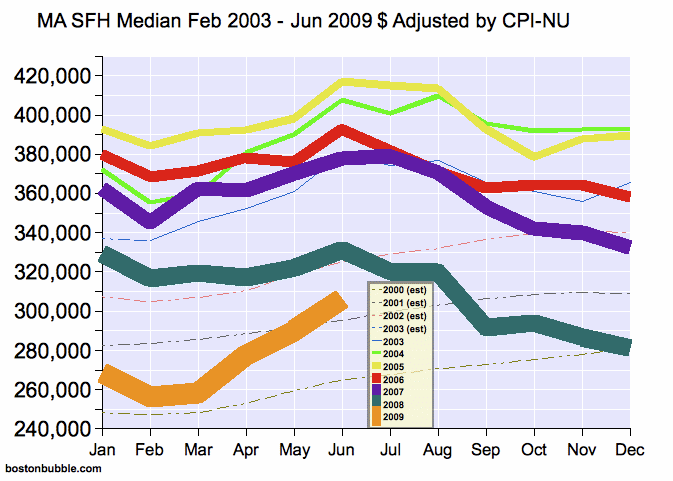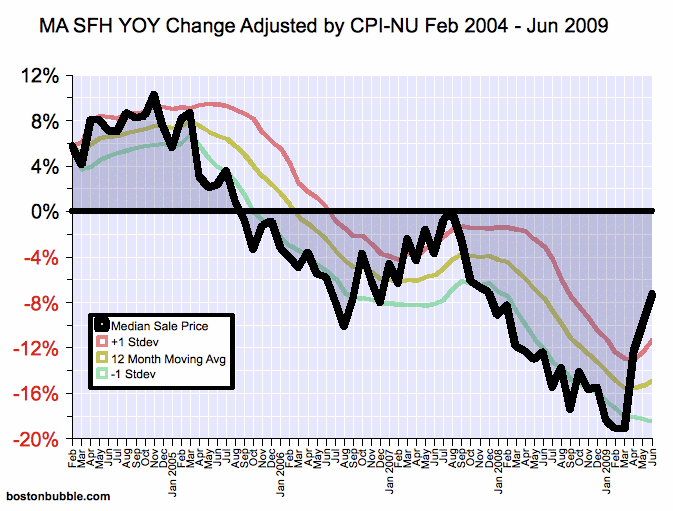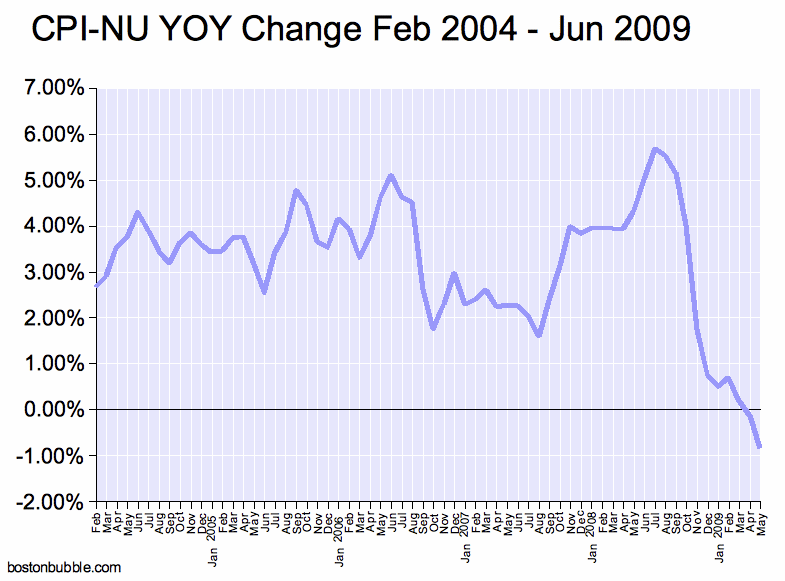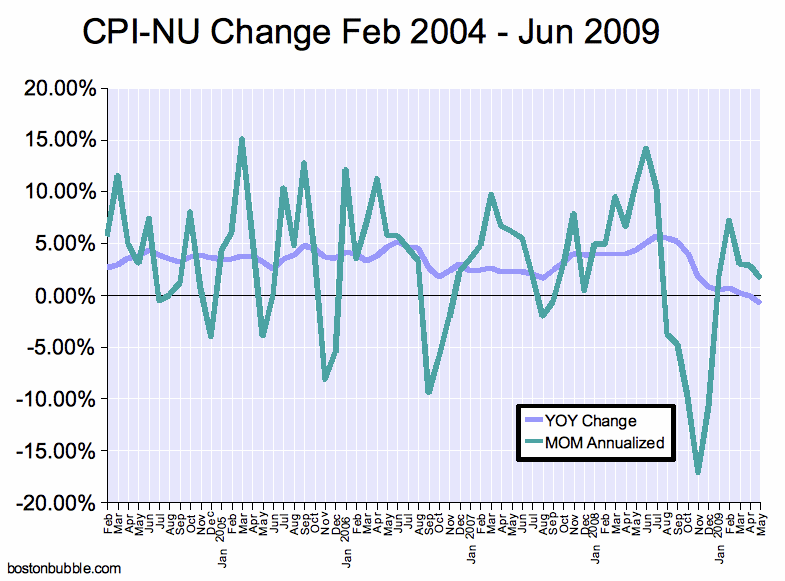 |
bostonbubble.com
Boston Bubble - Boston Real Estate Analysis
|
|
SPONSORED LINKS
Advertise on Boston Bubble
Buyer brokers and motivated
sellers, reach potential buyers.
www.bostonbubble.com
YOUR AD HERE
|
|
DISCLAIMER: The information provided on this website and in the
associated forums comes with ABSOLUTELY NO WARRANTY, expressed
or implied. You assume all risk for your own use of the information
provided as the accuracy of the information is in no way guaranteed.
As always, cross check information that you would deem useful against
multiple, reliable, independent resources. The opinions expressed
belong to the individual authors and not necessarily to other parties.
|
| View previous topic :: View next topic |
| Author |
Message |
admin
Site Admin
Joined: 14 Jul 2005
Posts: 1826
Location: Greater Boston
|
 Posted: Fri Jul 31, 2009 4:03 pm GMT Post subject: Boston Bubble Brief: The Real Story for MA - Jun 2009 Posted: Fri Jul 31, 2009 4:03 pm GMT Post subject: Boston Bubble Brief: The Real Story for MA - Jun 2009 |
 |
|
This is a brief report on what the data for the housing market in Massachusetts looks like in real terms. Market data is typically reported in nominal terms which can be misleading because it combines changes in housing values with changes in the value of the dollar. Correcting for inflation removes changes in the dollar as a factor and gives a more accurate picture of how housing values have changed. This report is based on the published data of the Massachusetts Association of Realtors, though it should be noted that the S&P/Case-Shiller Index is a superior data source.
The Massachusetts Association of Realtors released their data for June 2009 on Tuesday, July 28th. While the raw prices were provided in nominal terms, for this report they have been adjusted for inflation using the CPI Northeast Urban numbers available at http://www.bls.gov/cpi/ Adjusting for inflation produced the data represented by the graphs below. Prices for January 2003 and earlier have been estimated by applying the earliest reported median from The MAR, February 2003, against the S&P/Case-Shiller Index for the Boston area. Suggestions for improving this estimate are welcome.
Full Price History

Change in Median Price From One Year Earlier, February 2004 - June 2009
Seasonal variations are removed by comparing prices from the same month in the prior year.

Some observations:
- The real decline from June 2008 to June 2009 was 7.55%.
- For the third month in a row, the year over year decline was above the normal range, with April being the first time since August 2007 that the decline has been one standard deviation or more above the moving average. This continues the abrupt departure from ever deepening declines which began in April and suggests that declines may be moderating.
- Real prices are once again lower than the same month in any other year in the time period covered by The MAR.
- Prices are now 26.58% below the peak set in June 2005. This is the result of a 18.13% decline in nominal housing prices and a 10.32% decline in the purchasing power of the dollar. The peak decline is especially relevant this month because it is a direct comparison of the same month (June) in both years, which gives a picture that is not skewed by seasonality.
- The cumulative price decline from the beginning (Feb 2003) is 8.88%, which is an annualized decline of 1.46%.
- The price is above the estimate for the same month in 2001 for the first time since dipping below it last September.
Inflation has played a large part in this year's spring bounce. The year over year change in the CPI-NU was actually negative for the last three months, making the real decline in housing prices smaller than what has been reported by the media. This effect will be temporary, though, as the year over year decline in consumer prices is the result of a deflationary spike from last fall which has already run its course, as can be seen from the following graphs:


The S&P/Case-Shiller Index for Boston is likely superior to the data above as it corrects for many flaws that are inherent when using only the median price. The S&P/Case-Shiller Index also has the advantage that futures contracts can be traded against it, thereby offering an unbiased insight into where housing prices are expected to be in the future. It also has more extensive historical data available. The MAR data was used for this report mainly out of inertia and might be replaced with the S&P/Case-Shiller Index in future reports.
As usual, please do try this at home. Double checking of the math used to construct the above graphs and analysis is strongly encouraged in order to help ferret out any errors. The data was derived from the following sources:
The text of this post and the associated graphs are Copyright 2009 by bostonbubble.com with all rights reserved, except as stated here. You may reproduce each graph individually or the text of the entire post as a whole (including graphs) under the Creative Commons Attribution-No Derivative Works 3.0 Unported License. You may additionally scale the graphs to fit your work. Alternatively, if you remove the bostonbubble.com signature from the bottom left hand corner of the images within this post, those modified images (and only those modified images) can then be distributed under the Creative Commons Attribution 3.0 Unported License. In all cases, attribution should be made via a hyperlink to http://www.bostonbubble.com/forums/viewtopic.php?t=2143 or http://www.bostonbubble.com/ Quoting excerpts of the text is also allowed provided that the quotes would normally fall under fair use. To request other terms for reproduction, please post your request in the original thread at http://www.bostonbubble.com/forums/viewtopic.php?t=2143
The latest version of this report can be found at http://www.bostonbubble.com/latest.php?id=ma_inflation
- admin |
|
| Back to top |
|
 |
Kevin
Guest
|
 Posted: Sun Aug 02, 2009 5:11 pm GMT Post subject: But Posted: Sun Aug 02, 2009 5:11 pm GMT Post subject: But |
 |
|
The CPI doesn't measure the large component of deflation which is the
fall in housing prices itself... because it uses a renters'
equivalent...
the fact that the price of other goods is now falling more quickly
rather than lagging behind housing, doesn't say anything about whether
the housing decline is slowing down... |
|
| Back to top |
|
 |
admin
Site Admin
Joined: 14 Jul 2005
Posts: 1826
Location: Greater Boston
|
 Posted: Sun Aug 02, 2009 9:18 pm GMT Post subject: Re: But Posted: Sun Aug 02, 2009 9:18 pm GMT Post subject: Re: But |
 |
|
| Kevin wrote: |
the fact that the price of other goods is now falling more quickly
rather than lagging behind housing, doesn't say anything about whether
the housing decline is slowing down... |
Yes it does (or rather, yes it would if prices of other goods were still falling). You have to factor out the portion of falling prices that are due to a strengthening dollar (in the rare cases where that happens) just as you need to factor out the portion of rising prices that are due to a falling dollar in normal times. Only when you factor out the general price movement from the movement of an individual asset class' price can you identify the real trend that is distinct from general price trends.
- admin |
|
| Back to top |
|
 |
Kevin
Guest
|
 Posted: Mon Aug 03, 2009 3:57 am GMT Post subject: Posted: Mon Aug 03, 2009 3:57 am GMT Post subject: |
 |
|
Point taken. I believe I misspoke in trying to comment briefly.
I guess what I was trying to say is that, if you think about the basket of goods that consumers think about when they think, "how much is my dollar worth?", the price of a house is one of the big elements of that basket. Therefore, my real concern is that housing prices are not in the CPI basket, so we are adjusting for an incomplete CPI basket. I think if housing prices were adjusted for a CPI that included housing prices, the effect you describe would be still present, but attenuated.
Kevin |
|
| Back to top |
|
 |
admin
Site Admin
Joined: 14 Jul 2005
Posts: 1826
Location: Greater Boston
|
 Posted: Mon Aug 03, 2009 4:07 am GMT Post subject: Posted: Mon Aug 03, 2009 4:07 am GMT Post subject: |
 |
|
| Kevin wrote: | | Therefore, my real concern is that housing prices are not in the CPI basket, so we are adjusting for an incomplete CPI basket. |
That's a tough problem to tackle. I read a paper once on the various options which could be used to include housing in the basket of goods for an index, and all of the options had weak points. Rent is included in the CPI, and so the portion of housing prices which is attributable to the basic need of shelter is included. I personally felt like that was good enough considering that it captured the essential level of shelter and because including the price of purchasing housing would have been significantly more complicated and error prone.
- admin |
|
| Back to top |
|
 |
john p
Joined: 10 Mar 2006
Posts: 1820
|
 Posted: Mon Aug 03, 2009 2:06 pm GMT Post subject: Posted: Mon Aug 03, 2009 2:06 pm GMT Post subject: |
 |
|
I think it is smart to understand the ingredients of the CPI's basket of goods because these readings do get impacted if one of the ingredients has a price spike i.e. the gasoline spike's impression this time last year.
Admin's diagnostic tool is a constant but it does manifold a variety of behaviors relative to the ingredients of the measures of inflation, which is why it is good to look at both this and the Case Shiller as he suggests. I think this compiments Case Shiller because you see housing in context.
I think it is good to talk about the differences in the behavior of house prices to rental prices. I like this diagnostic because it fosters that dialogue between the elements of inflation with housing prices. I mean the hikes in MBTA are worth recognizing as well as the price of gasoline because it changes people's positoins regarding their commutes and how much it costs a place to heat. I haven't priced out rents for a 2 bed lately, I'd imagine that they've stayed flat? This is a tough month to get a reading because you've got the college students.
The wife and I went to IKEA this weekend and saw a ton of college students there. Our visit was cut short because 45 minutes prior we went to a place that had 99 cent individual pizzas and we both started to cramp up.... |
|
| Back to top |
|
 |
GenXer
Joined: 20 Feb 2009
Posts: 703
|
 Posted: Tue Aug 04, 2009 10:52 am GMT Post subject: Posted: Tue Aug 04, 2009 10:52 am GMT Post subject: |
 |
|
CPI does not include gas or food prices. Therefore its bogus. Prices of food move up constantly, sometimes as much as 50% or so. Anybody who's buying a wide variety of raw foods would know that. Here's what the government is doing. Suppose you have two random variables. Call one X, and one Y. The X variable is Gaussian, moves in nice slow steps. The variable Y is chaotic, and it moves in large jumps. If you add X and Y together, the result will be more like Y than like X (given that both X and Y magnitudes are comparable). Hence, by eliminating Y from the mix, the government is attempting to in fact cook the books. What does that accomplish? This lowers the liability of the government (i.e. they pay 0 interest on Treasuries/I bonds/TIPs, and borrow money cheaper). As long as rents/house prices are falling, regardless of the high oil and food prices (and the cascading effect of the oil prices on all the products whose prices directly depend on the price of energy, which is almost everything), the so-called inflation is 0 or even negative.
Because the housing is not currently perceived as a good investment by most people (I hope), and CDs/money markets pay next to nothing (not to mention I-bonds, Treasuries and TIPs), this leaves nothing but the stock market (which is also not perceived currently to be a good investment), so people are saving money in banks and insured accounts, which only accomplishes one thing - it gives the banks a lot of free cash to risk to make a profit (and allows for a future return of exactly the same problems the banks have been facing all along). |
|
| Back to top |
|
 |
admin
Site Admin
Joined: 14 Jul 2005
Posts: 1826
Location: Greater Boston
|
 Posted: Tue Aug 04, 2009 12:39 pm GMT Post subject: Posted: Tue Aug 04, 2009 12:39 pm GMT Post subject: |
 |
|
| GenXer wrote: | | CPI does not include gas or food prices. Therefore its bogus. |
Yes it does. You're thinking of "core CPI," which is not what was used here.
- admin |
|
| Back to top |
|
 |
admin
Site Admin
Joined: 14 Jul 2005
Posts: 1826
Location: Greater Boston
|
 Posted: Tue Aug 04, 2009 12:40 pm GMT Post subject: Posted: Tue Aug 04, 2009 12:40 pm GMT Post subject: |
 |
|
In fact, the drop in oil last fall was precisely the reason for the spike of deflation, if I remember correctly.
- admin |
|
| Back to top |
|
 |
GenXer
Joined: 20 Feb 2009
Posts: 703
|
 Posted: Tue Aug 04, 2009 2:23 pm GMT Post subject: Posted: Tue Aug 04, 2009 2:23 pm GMT Post subject: |
 |
|
| The core CPI is used where it matters most. That was the point. However, I do agree that you need to use the CPI which includes food and energy when normalizing Case-Schiller index. |
|
| Back to top |
|
 |
mpr
Joined: 06 Jun 2009
Posts: 344
|
 Posted: Tue Aug 04, 2009 2:40 pm GMT Post subject: Posted: Tue Aug 04, 2009 2:40 pm GMT Post subject: |
 |
|
Admin - could you post the data unadjusted for CPI, as I think you had
in previous posts.
I think that is more interesting from the point of view of tracking short
term dynamics. Certainly in the medium to long term the CPI adjusted
number offers a clearer pictures, but in the short term its only
relevant if any deflation is feeding through to wage deflation.
Even if that is the case it would be interesting to see separate it out.
I'm guessing you would still see a clear up tick, although perhaps
somewhat less pronounced. |
|
| Back to top |
|
 |
admin
Site Admin
Joined: 14 Jul 2005
Posts: 1826
Location: Greater Boston
|
 Posted: Tue Aug 04, 2009 2:56 pm GMT Post subject: Posted: Tue Aug 04, 2009 2:56 pm GMT Post subject: |
 |
|
| GenXer wrote: | | The core CPI is used where it matters most. That was the point. |
It sounds like you're retroactively changing your point. Everybody here was talking about applying the CPI to housing numbers, not its general application, and Kevin, John P., and I all indicated we were talking about the regular CPI (not "core"). A criticism of "core CPI" in that context would have been off topic, and it also would have been non-obvious without a mention of "core."
- admin |
|
| Back to top |
|
 |
GenXer
Joined: 20 Feb 2009
Posts: 703
|
 Posted: Tue Aug 04, 2009 3:10 pm GMT Post subject: Posted: Tue Aug 04, 2009 3:10 pm GMT Post subject: |
 |
|
| True, I made a mistake at first thinking that core CPI was used. |
|
| Back to top |
|
 |
john p
Joined: 10 Mar 2006
Posts: 1820
|
 Posted: Tue Aug 04, 2009 4:24 pm GMT Post subject: Posted: Tue Aug 04, 2009 4:24 pm GMT Post subject: |
 |
|
This discussion regarding different inflation Indices is a good one, even if someone misspeaks because it identifies the period of time where that point of distinction became more meaningful.
I remember when we had discussions regarding how much influence the FED had in mortgage rates and how they were limited and it was more of an indirect relationship. Prior to that, mortgage rates followed the FED rates so people thought they were directly tied and only when they started to separate did people get the distinction.
Remember when Jumbo Rates divorced from the rest?
I've always tried to throw a splash of context (political or economic) into these updates because I think someday it might be valuable to have a timeline and some noted attributes of events to help us understand the forces present at that particular point in time.
Right now we're looking at year over year numbers so we have to understand now and the situation at the same time last year... Is it last year's turbulence that is echoing now? |
|
| Back to top |
|
 |
admin
Site Admin
Joined: 14 Jul 2005
Posts: 1826
Location: Greater Boston
|
 Posted: Wed Aug 05, 2009 8:25 pm GMT Post subject: Posted: Wed Aug 05, 2009 8:25 pm GMT Post subject: |
 |
|
| mpr wrote: | Admin - could you post the data unadjusted for CPI, as I think you had
in previous posts.
|
I wanted to let you know I'm not ignoring this, I just haven't had time yet. I don't believe I've done nominal charts for the MAR numbers before - you're probably thinking of the S&P/Case-Shiller Boston snapshots. I'll try to do it for this thread too, if I get some time (which is uncertain at the moment).
- admin |
|
| Back to top |
|
 |
|
|
You can post new topics in this forum
You can reply to topics in this forum
You cannot edit your posts in this forum
You cannot delete your posts in this forum
You cannot vote in polls in this forum
|
Forum posts are owned by the original posters.
Forum boards are Copyright 2005 - present, bostonbubble.com.
Privacy policy in effect.
Powered by phpBB © 2001, 2005 phpBB Group
|






